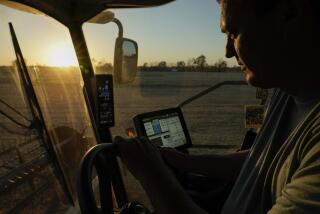Plowing Under the American Farmer
After a century-long struggle for survival, the American farmer is about to be liquidated--overcome by the combined forces of national indifference, corporate greed and government enmity.
Exactly 90 years ago, when the war against the small “family” farm was still young, the most powerful spokesman for agrarian America, William Jennings Bryan, gave voice to the farmers’ beleaguered frustration in terms that would also describe today’s distress, had we not lost the gift of eloquence.
“We have petitioned,” he told the Chicago Democratic convention, “and our petitions have been scorned; we have entreated, and our entreaties have been disregarded; we have begged, and they have mocked when our calamity came.”
Last week, in tones of similar anguish, the Democratic Party chairman of a leading farm state telephoned an influential Washington politician, an adviser to past Presidents, detailing the distress of constituents--already crushed into poverty--now about to be driven by bankruptcy and foreclosure from land that they had so lovingly cultivated. The politician began to respond with a customary, soothing offer of help. Then, struck by a sudden attack of apolitical honesty, he interrupted himself in mid-sentence to say, “The truth is, Charlie, nobody cares. Nobody in this city gives a damn.” An exaggeration? Perhaps. But not much of one. The reality is that we intend to stand apart in casual curiosity while, over the next year or two, hundreds of thousands of farmers are stripped of their independent toil.
“We are,” reported a leading economic paper in one of those mind-numbing euphemisms characteristic of modern media, “at the edge of a farm shakeout.” The agonized faces, the tears, the occasional suicides have been brought to us in living color by the mindless screen that, because it illustrates without explanation or passion, transforms compassion into transient curiosity that seems to pass as quickly as the camera moves from Iowa and Nebraska to the “Wheel of Fortune,” where the American dream still flourishes.
In our age of gigantic economic bureaucracies, what could appear more normal than the abandonment of all farming to the indifferent mercies of corporate agriculture--the triumph, we are told, of superior efficiencies, economies of scale, the ultimately benign principles of free enterprise and the competitive struggle? But this is a myth, a lie, which makes all of us accomplices in accelerating destruction.
The fact is that the small farm is more economically efficient than is corporate agriculture. It can, acre for acre, produce a better product at a better price--an ability supposed to be the source of competitive success. It is not superior production that has undone the farmer but the power of money and the actions of a Department of Agriculture that, for more than one Administration, has at public expense faithfully served the corporations that are about to complete their conquest of American agriculture.
These intricate relationships require some accurate over simplifications. Agricultural corporations have not expanded because they are better farmers. They had access to large amounts of capital. And they used it to buy the land. Money fueled not only growth but also the ability to dominate a nationwide system of distribution and marketing, limiting the access of smaller farms.
This flow of capital--along with the economic dislocations of recent decades--also helped drive up the price of farmland, tempting some farmers to sell out and others to increase their debt. When demand slackened and prices dropped, the inevitable arrived: bankruptcy and foreclosure for individuals who, unlike the corporations, lacked the reserves to endure less prosperous times.
Undoubtedly many farmers are the victims of their own miscalculations. But it is equally true that, while unsophisticated in money matters, they were seduced by banks that lavishly, even recklessly, extended credit based on their own economic misjudgments. Now, being hard-pressed, these banks seek compensation for their errors by taking the land. For the farmer, of course, there is no compensation.
This misfortune may seem unavoidable, but only if we view it as a contest for survival between farmers and their banks. But it is more than that. It is a national responsibility, the consequence of national economic and political policies. We are readily prepared to roll over, even forgive, billions of dollars in unpayable debts from foreign countries while abandoning our farmers to the hazards of the times. This seeming inconsistency dissolves under the awareness that in both cases we are protecting the banks, which can easily foreclose an Iowa farmer but not the country of Peru.
We can see, even measure, the human distress that is the consequence of this attack on the American farmer. We have no way to gauge the loss to America--an immense and valuable heritage destroyed not by obsolescence but by uneconomic power and by the indifferent selfishness of a country unwilling to protect this essential element of our health as a national community.
More to Read
Get the L.A. Times Politics newsletter
Deeply reported insights into legislation, politics and policy from Sacramento, Washington and beyond. In your inbox three times per week.
You may occasionally receive promotional content from the Los Angeles Times.










